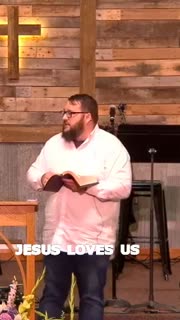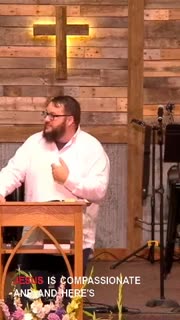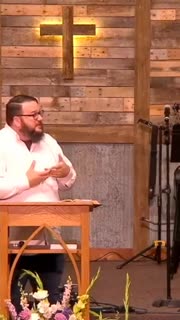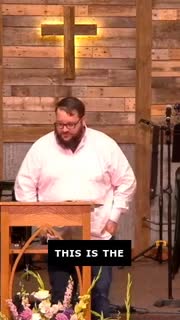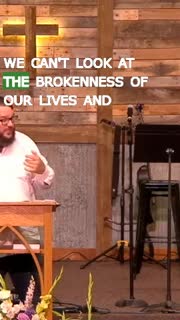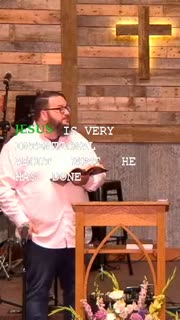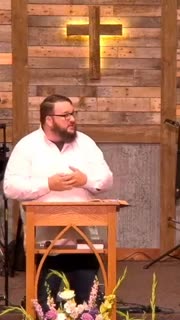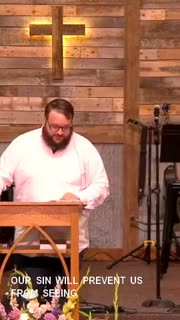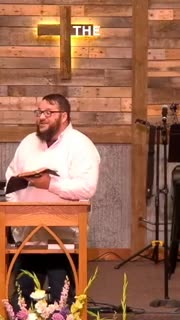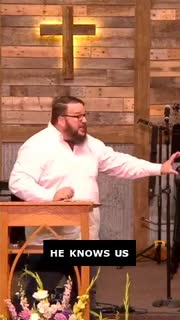Desiring True Healing: Jesus' Transformative Power
Summary
### Summary
In today's sermon, we delved into John chapter 5, focusing on Jesus' encounter with a man who had been an invalid for 38 years. This story is not just about physical healing but about understanding who Jesus is and what He offers us. Jesus intentionally goes to the pool of Bethesda, a place filled with people who are physically and psychologically broken, and seeks out this one man. This act demonstrates Jesus' deep compassion and intentionality. He asks the man, "Do you want to be healed?"—a question that goes beyond physical ailment and addresses the man's deeper need for spiritual and emotional healing.
The man’s response reveals a reluctance to change, a common human trait when faced with the transformative power of Jesus. Despite the man's lack of faith or understanding, Jesus heals him, showing that His power and compassion are not limited by our responses. This healing, however, is not just about physical restoration; Jesus later finds the man in the temple and tells him to "sin no more," indicating that true healing involves a transformation of the heart and life.
The story also highlights the legalistic mindset of the Jewish leaders who focus on the Sabbath law rather than the miraculous healing. This serves as a caution against missing the essence of Jesus' work due to rigid adherence to rules or traditions. The man's initial reaction to his healing—reporting Jesus to the authorities—contrasts sharply with other encounters in John where individuals respond with faith and testimony.
Ultimately, the sermon challenges us to reflect on our own willingness to be healed by Jesus. Do we truly want the transformative power of Jesus in our lives, or are we content with superficial changes? Jesus knows us deeply, has compassion for us, and has the power to transform us, but we must be willing to accept His invitation and allow Him to work in our lives.
### Key Takeaways
1. Jesus' Intentionality and Compassion: Jesus intentionally seeks out the man at the pool of Bethesda, demonstrating His deep compassion and desire to heal us, not just physically but spiritually and emotionally. This act shows that Jesus is willing to go to places others avoid to bring healing and restoration. [06:53]
2. The Deeper Question of Healing: When Jesus asks the man, "Do you want to be healed?" He is addressing more than just physical ailment. This question challenges us to consider whether we truly desire the transformative power of Jesus in our lives or if we are content with our current state. [10:45]
3. Jesus' Power and Knowledge: Jesus knows us intimately and has the power to heal and transform us. His healing of the man, despite the man's lack of faith, shows that Jesus' power is not limited by our responses. This underscores the importance of recognizing Jesus' authority and compassion in our lives. [12:46]
4. Legalism vs. True Healing: The reaction of the Jewish leaders, who focus on the Sabbath law rather than the miraculous healing, serves as a caution against legalism. It reminds us that rigid adherence to rules can cause us to miss the essence of Jesus' work and the true healing He offers. [23:28]
5. The Call to True Transformation: Jesus' instruction to the healed man to "sin no more" highlights that true healing involves a transformation of the heart and life. Our sin can prevent us from fully experiencing Jesus' healing, and we must be willing to let go of our sinful ways to embrace the new life Jesus offers. [30:49]
### YouTube Chapters
[0:00] - Welcome
[01:57] - Introduction to John Chapter 5
[03:42] - Setting the Scene: The Pool of Bethesda
[05:07] - Jesus' Intentional Visit
[06:53] - Jesus' Compassion and Intentionality
[08:55] - The Man's Condition and Jesus' Question
[10:45] - The Deeper Question of Healing
[12:46] - Jesus' Knowledge and Power
[14:38] - The Missing Verse Explanation
[17:56] - Personal Story: The Man on the Road
[19:34] - Jesus' Compassion and Healing
[21:24] - The Power of Jesus' Words
[23:28] - Legalism vs. True Healing
[25:23] - Different Responses to Jesus
[27:03] - The Man's Reaction and Legalism
[28:58] - Jesus' Intentional Ministry
[30:49] - The Call to True Transformation
[32:55] - The Question of True Healing
[34:43] - Knowing Jesus and Daily Transformation
[36:37] - Closing Prayer
Study Guide
### Bible Study Discussion Guide
#### Bible Reading
- John 5:1-15
#### Observation Questions
1. What was the condition of the man Jesus encountered at the pool of Bethesda, and how long had he been in that condition? ([03:42])
2. How did the man respond when Jesus asked him, "Do you want to be healed?" ([10:45])
3. What was the reaction of the Jewish leaders to the man's healing, and what does this reveal about their priorities? ([23:28])
4. What did Jesus tell the man after finding him in the temple, and what does this indicate about the nature of true healing? ([30:49])
#### Interpretation Questions
1. Why do you think Jesus chose to heal only one man at the pool of Bethesda, despite the multitude of people there? ([06:53])
2. What does the man's initial reluctance to answer Jesus' question about healing suggest about human nature and our response to Jesus' transformative power? ([10:45])
3. How does the reaction of the Jewish leaders to the healing on the Sabbath serve as a caution against legalism in our own lives? ([23:28])
4. What does Jesus' instruction to the healed man to "sin no more" teach us about the relationship between physical healing and spiritual transformation? ([30:49])
#### Application Questions
1. Reflect on a time when you felt reluctant to change or accept help. How does this relate to the man's response to Jesus' question, "Do you want to be healed?" ([10:45])
2. In what areas of your life do you need to experience Jesus' transformative power? Are there any specific sins or habits you need to let go of to embrace true healing? ([30:49])
3. How can we avoid a legalistic mindset that focuses on rules rather than the essence of Jesus' work? Share an example from your own life where you might have prioritized rules over compassion. ([23:28])
4. Jesus intentionally sought out the man at the pool of Bethesda. How can we be more intentional in seeking out and helping those who are in need around us? ([06:53])
5. The healed man reported Jesus to the authorities instead of responding with faith and testimony. How can we ensure that our response to Jesus' work in our lives is one of gratitude and testimony? ([25:23])
6. Jesus knows us intimately and has compassion for us. How can we cultivate a deeper relationship with Jesus to better understand His will and experience His healing in our lives? ([12:46])
7. Reflect on the question, "Do you truly want to be healed?" What steps can you take this week to invite Jesus' transformative power into a specific area of your life? ([34:43])
Devotional
Day 1: Jesus' Intentionality and Compassion
Jesus intentionally seeks out the man at the pool of Bethesda, demonstrating His deep compassion and desire to heal us, not just physically but spiritually and emotionally. This act shows that Jesus is willing to go to places others avoid to bring healing and restoration. Jesus' actions at the pool of Bethesda reveal His heart for those who are marginalized and suffering. He does not wait for people to come to Him; instead, He goes to them, meeting them in their place of need. This intentionality is a powerful reminder that Jesus sees us, knows our struggles, and is actively seeking to bring healing into our lives.
In our own lives, we often find ourselves in places of brokenness, whether physically, emotionally, or spiritually. Jesus' example challenges us to consider how we can be intentional in seeking out those who are hurting around us. Are we willing to go to the places that others avoid? Are we ready to extend the same compassion and intentionality that Jesus showed? Reflect on how you can be a vessel of Jesus' love and healing in your community. [06:53]
John 5:6-7 (ESV): "When Jesus saw him lying there and knew that he had already been there a long time, he said to him, 'Do you want to be healed?' The sick man answered him, 'Sir, I have no one to put me into the pool when the water is stirred up, and while I am going another steps down before me.'"
Reflection: Think of someone in your life who is struggling or in need. How can you intentionally reach out to them this week and show them the compassion of Jesus?
Day 2: The Deeper Question of Healing
When Jesus asks the man, "Do you want to be healed?" He is addressing more than just physical ailment. This question challenges us to consider whether we truly desire the transformative power of Jesus in our lives or if we are content with our current state. Jesus' question to the man at the pool of Bethesda goes beyond the surface level of physical healing. It probes into the deeper issues of the heart, asking whether the man truly desires to be made whole in every aspect of his life. This question is relevant to us today as we often seek superficial changes without addressing the root causes of our struggles.
Jesus' healing is holistic, encompassing physical, emotional, and spiritual restoration. To experience this transformative power, we must be willing to confront the deeper issues within us and allow Jesus to work in those areas. Are we ready to let go of our comfort zones and embrace the full healing that Jesus offers? Reflect on the areas of your life where you need Jesus' transformative power and consider how you can open yourself up to His healing touch. [10:45]
Jeremiah 17:14 (ESV): "Heal me, O Lord, and I shall be healed; save me, and I shall be saved, for you are my praise."
Reflection: What is one area of your life where you have been reluctant to seek Jesus' healing? How can you invite Him into that area today and allow His transformative power to work?
Day 3: Jesus' Power and Knowledge
Jesus knows us intimately and has the power to heal and transform us. His healing of the man, despite the man's lack of faith, shows that Jesus' power is not limited by our responses. This underscores the importance of recognizing Jesus' authority and compassion in our lives. Jesus' knowledge of the man's condition and His willingness to heal him despite the man's lack of faith highlight the boundless nature of Jesus' power and compassion. Jesus does not require perfect faith or understanding from us; He meets us where we are and extends His healing grace.
This truth is a source of great comfort and encouragement. It reminds us that Jesus' ability to heal and transform is not dependent on our efforts or responses. He knows us intimately, understands our struggles, and is always ready to extend His healing touch. Reflect on the areas of your life where you need to recognize Jesus' authority and compassion. How can you trust in His power to bring healing and transformation, even when your faith feels weak? [12:46]
Psalm 139:1-3 (ESV): "O Lord, you have searched me and known me! You know when I sit down and when I rise up; you discern my thoughts from afar. You search out my path and my lying down and are acquainted with all my ways."
Reflection: In what ways have you doubted Jesus' ability to heal and transform you? How can you remind yourself of His intimate knowledge and power in your life today?
Day 4: Legalism vs. True Healing
The reaction of the Jewish leaders, who focus on the Sabbath law rather than the miraculous healing, serves as a caution against legalism. It reminds us that rigid adherence to rules can cause us to miss the essence of Jesus' work and the true healing He offers. The Jewish leaders' response to the healing at the pool of Bethesda reveals a legalistic mindset that prioritizes rules over the miraculous work of Jesus. Their focus on the Sabbath law blinds them to the profound healing that has taken place, highlighting the danger of rigid adherence to traditions at the expense of recognizing Jesus' transformative power.
This serves as a cautionary tale for us today. It is easy to become so focused on religious rules and traditions that we miss the essence of Jesus' work in our lives and the lives of others. True healing and transformation come from a relationship with Jesus, not from legalistic practices. Reflect on areas where you may have allowed legalism to overshadow the work of Jesus in your life. How can you shift your focus to embrace the true healing that Jesus offers? [23:28]
Matthew 23:23 (ESV): "Woe to you, scribes and Pharisees, hypocrites! For you tithe mint and dill and cumin, and have neglected the weightier matters of the law: justice and mercy and faithfulness. These you ought to have done, without neglecting the others."
Reflection: Are there any areas in your life where you have prioritized rules or traditions over the essence of Jesus' work? How can you refocus on the true healing and transformation that Jesus offers?
Day 5: The Call to True Transformation
Jesus' instruction to the healed man to "sin no more" highlights that true healing involves a transformation of the heart and life. Our sin can prevent us from fully experiencing Jesus' healing, and we must be willing to let go of our sinful ways to embrace the new life Jesus offers. Jesus' command to the healed man to "sin no more" underscores the connection between physical healing and spiritual transformation. True healing is not just about the restoration of the body but also about the renewal of the heart and mind. Jesus calls us to a life of holiness and righteousness, free from the bondage of sin.
Our sin can hinder us from fully experiencing the healing and transformation that Jesus offers. To embrace the new life that Jesus provides, we must be willing to let go of our sinful ways and allow Him to transform us from the inside out. Reflect on the areas of your life where sin may be preventing you from experiencing Jesus' healing. How can you respond to Jesus' call to true transformation and live a life that reflects His holiness? [30:49]
Ephesians 4:22-24 (ESV): "To put off your old self, which belongs to your former manner of life and is corrupt through deceitful desires, and to be renewed in the spirit of your minds, and to put on the new self, created after the likeness of God in true righteousness and holiness."
Reflection: What is one specific sin or habit that you need to let go of to fully experience Jesus' healing and transformation? How can you take a step towards true transformation today?
Quotes
### Quotes for Outreach
1. "Jesus loves us and he cares deeply about us and in what usually happens in the world in our in our lives is we miss out on who Jesus is and what he does we don't know Jesus well and so the impact that has on our lives is lessened because of it." [08:55] (24 seconds)
2. "Jesus is compassionate and and here's the thing I think if you looked at this from a worldly perspective you would say that's crazy Jesus shows up to go after one man when there are hundreds of people at this pool looking to be healed and Jesus shows up for one man because he cares deeply for one man." [14:38] (29 seconds)
3. "The power of Jesus is incredible he he knows us he desires for us to have true change in our life he has compassion for our brokenness he has compassion for the struggles we have in life he he sees them he knows them he wants us to be rescued from them but then the question do you want to be healed." [21:24] (23 seconds)
4. "This is the Jesus that loves you he knows you he has compassion for where you're at in your life whatever situation you're going through and he has the power to move and again the question comes up do you want to be healed." [21:24] (28 seconds)
5. "We can't look at the brokenness of our lives and desire to live in it because Jesus wants all of it we have to allow his love his compassion his power to move or we're going to be like this guy." [28:58] (14 seconds)
### Quotes for Members
1. "Jesus is very intentional about what he has done and so I want you to think about this because what John has been doing for the last several months for us that we've seen in John is he's Jesus has been having these one-on-one encounters with different people you have the encounter with Nicodemus you have the encounter with the people who are with the Samaritan woman and you have the encounter encounter with the official and each encounter is different and the results of each encounter is honestly different too." [06:53] (32 seconds)
2. "Jesus knows this man Jesus knew he'd been laying there a long time he specifically sought out after this man Jesus absolutely without a shadow of a doubt knew that he was going to be healed and knows everything about this person we've seen that time and time again with Jesus's personal meetings with people already in the book of John and now we have this moment where Jesus specifically goes to the pool he specifically seeks out this one man and he specifically asked him a question that would as Jesus always does address a heart issue do you want to be healed." [10:45] (39 seconds)
3. "Our sin will prevent us from seeing Jesus our sin can easily become comfortable or even natural to us it can become a way of life and we can begin to play patty cake with the scriptures and make our sin less sinful than it really is and then we begin to justify it in our lives and Jesus comes to this man he heals him he goes and finds him again and says listen if you want true healing you gotta stop you gotta come to me." [30:49] (41 seconds)
4. "The question is and the question will always remain do you truly want to be healed are we going to see Jesus as who he is and allow him to heal us or are we going to just push him off to the side or even blame him for the way our lives are so what do you want to do with the power and the love and the compassion of Jesus." [34:43] (29 seconds)
5. "He knows us he desires for us to have true change in our life he has compassion for our brokenness he has compassion for the struggles we have in life he he sees them he knows them he wants us to be rescued from them but then the question do you want to be healed." [21:24] (19 seconds)
